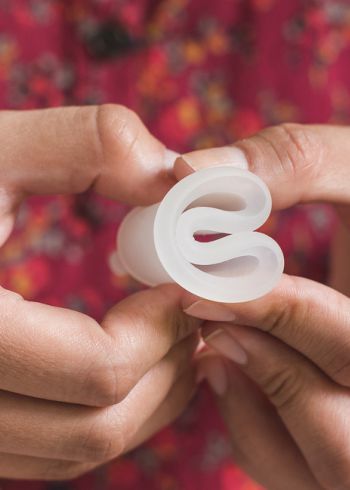Wonder Why You Get Menstrual Migraine?

Menstrual days never come alone; they enter our life with multiple problems like cramps, pains, mood swings and even headaches but some issues are so severe that we need to consult a doctor immediately. Menstrual migraine is one such condition.
Do You Know What Causes Menstrual Migraine?
Have you ever experienced migraines every month or so around your period? You don’t believe the two are connected. Menstrual migraines affect around 60% of women who suffer from migraines. The level of estrogen and progesterone, the most important two female hormones, in your body reduces right before your period. This may result in pounding headaches which start three days before your period and may continue till two to three days after the onset of a woman’s menstruation.
However, anything that alters the amounts of these hormones can induce them. The severity of the change is determined by the degree to which those levels shift.
Symptoms
Common symptoms which you may notice:
- Throbbing pain on one side of the head
- Nausea, stomach upset, abdominal pain
- Vomiting
- Sensitivity to light and sound
- Headache pain that ranges from dull to a severe throb
- Feeling sweating or cold chills
- Loss of appetite
- Dizziness and blurred vision
- Pale skin color
- Feeling tired
- Diarrhea or fever
What’s a migraine? What does it feel like?
Women are three times as likely as males to get migraine attacks.There are approximately 70% of women migraine sufferers,and Sixty per cent to seventy percent of these women say their migraine attacks are linked to their menstruation.
Menstrual migraine is one of the various types of headaches caused by menstruation.
What’s the relationship between hormones and headaches?
Changes in hormonal balance during menstrual days are common and these changes may lead you to a condition like migraine. Changes in estrogen levels are linked to headaches in women, particularly migraines. Estrogen levels plummet just before your menstrual cycle begins. Though they commonly occur shortly after the lowest levels of the feminine hormones estrogen and progesterone.
Migraine attacks are usually less frequent and less severe during pregnancy. Some women, however, claim that their migraines began during the first trimester of pregnancy and then disappeared.
What makes menstrual migraines different from other forms of migraines?
A decrease in the level of estrogen causes menstrual migraines. Stress, missing a meal, caffeine, and a variety of other factors can all provoke migraines.
DIAGNOSIS AND TESTS
To be sure there are no other causes for your headache, your healthcare practitioner may perform blood tests and imaging tests such as a CT scan or MRI. To rule out seizures, an electroencephalogram (eeg) may also be ordered.
Keep track of the symptoms you experience, how long they stay, and what makes your menstrual migraines worse or better. You and your doctor may be able to utilize that information to assist you in healing and possibly preventing or anticipating migraines.
MANAGEMENT AND TREATMENT
Nonsteroidal anti-inflammatory drugs (NSAIDs) are commonly used to treat menstrual migraine. The most commonly used nonsteroidal anti-inflammatory drugs (NSAIDs) for menstrual migraine include:
- Ketoprofen (Orudis)
- Ibuprofen (Advil and Motrin)
- Fenoprofen calcium (Nalfon)
The NSAID treatment should begin two to three days before the onset of your period and continue throughout your menstrual flow. The danger of gastrointestinal side effects is low because the medicine is only taken for a short duration.
- Posted in feminine hygiene, menstrual migraine, menstrual migraine normal, menstrual migraine reason, why you get menstrual migraine













